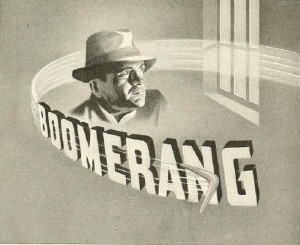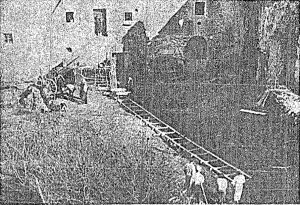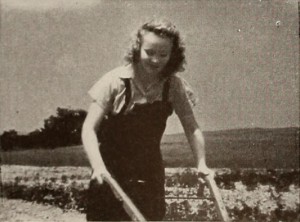"Various family members are seen in the garden of a large house, possibly The Beeches. A woman and baby sit on a blanket in the middle of the lawn. A uniformed nanny joins them with another baby. Concludes with a shot of the two babies together on the blanket" (NWFA Online Database).
"documentario a fantasia"/avant-garde documentary
"...che tratta della vita gioiosa dei bimbi in una delle tante colonie elioterapiche volute dal Duce per la sanità della stirpe."— I Littoriali del cinema: Un’altra interessante serie di documentari, La Stampa, September 3, 1939
"...which deals with the joyful life of children in one of the many heliotherapeutic colonies wanted by the Duce for the health of the lineage." — I Littoriali del cinema: Un’altra interessante serie di documentari, La Stampa, September 3, 1939
"Delmer J. Frazier, ACL, of Oakland, Calif., is a man who can see the fine possibilities for plot ideas sticking out all about him in the current popular magazines. In his delightful film, Black Magic, he used an advertisement, but stories and funny papers are pretty fertile too. His story opened with the young lad of the house immersed in the mystic joys offered by a pancake flour company. ''Send Ten Wrappers and Get the Magic Wand!" He did, the wand arrived and the fun began. Fun, until his chum said the wrong magic words and started to disappear — wand and all. Only heroic measures on the part of our hero (and the cameraman) saved the day." Movie Makers, April 1935, 167.
"This was a well thought picture, but lacked a bit in photography to stack up with the prize winners." American Cinematographer, Feb. 1936, 73.

"Boomerang is a simple, direct and hard hitting drama with a moral. Caught in lean times, a young man is laid off from his factory job. Lusting blindly for revenge, he kidnaps his boss's little daughter and sets off down the long, lonely road of the hunted fugitive. Days stretch into weeks, but still he eludes capture, as his patient little prisoner slowly melts his resentment with kindness and childish trust. At last, won over by the warmth of her love, he goes recklessly forth to get a doll that she wanted, only to meet death in a blaze of gunfire. The boomerang of revenge has come full circle. In this rather specialized drama, Chester Glassley has done a good job with a difficult story. The buildup is slow but relentless. The long series of outdoor hideouts is convincingly haunted with fear and menace, and the movie maker has done much to enhance their mood with an adroit use of his camera. Perhaps most outstanding, however, is the genuine portrayal of the little girl." Movie Makers, Dec. 1940, 602.
"Home movie made by Charles Devenish Woodley, showing the beekeeping operation at his home." Library and Archives Canada.
"Film about three little boys, played by Doug, Bill and Lorne Woodley, the sons of Charles Devenish Woodley, visiting the Canadian National Exhibition in Toronto on a sunny day." Library and Archives Canada.

"Film a soggetto"/Fiction film
"Il esso è descritto, attraverso infiniti particolari, la storia di un fanciullo traviato, che dopo un avventuroso vagabondaggio, viene rinchiuso in un Riformatorio giudiziario per l’espiazione della pena che gli è stata inflitta in seguito ad un reato da lui commesso. Ne seguano le trasformazione spirituale finché lo vediamo restituito alla società riabilitato."
"It describes, through infinite details, the story of a misguided child, who after adventurous vagrancy, is locked up in a reformatory for the expiation of the sentence imposed on him as a result of a crime he committed. Spiritual transformation follow until we see him returned to society rehabilitated."
The film was directed by special courtesy of the Minister di Grazia e Giustizia, nel R. Riformatorio giudiziario di Nisida (Napoli)
—Notizario delle sezioni cinematografiche dei gruppi universitari fascisti a cura del ministero della cultura popolare, September 1938 p. 11
"Inspired by a family funeral, three children in Cockermouth, Cumbria, give the recently deceased 'Jackdaw' a dignified send-off. Heather Harris, the youngest child, officiates as a priest. Sadly, no-one can now remember whether the deceased was a family pet or just a wild bird found in the garden, but this film remains as a fleeting, yet touching, picture of a moment in childhood" (BFI Player).

"Ross M. Gridley, filmer of By the Garden Steps, is an agricultural teacher who knows that many films used in education are, although they need not be, dull. He writes that he wanted "to prove that it is possible, as well as desirable, to increase interest by adding a touch of drama to instructional films, without losing any of the teaching value from a scientific standpoint." With this very sensible idea, Mr. Gridley tells the tale of three sisters who grow a 4-H Victory Garden. When they have worked away long enough for the audience to realize that a little more footage will be repetitive, the story shifts to a couple of youngsters who are shooting at targets. By means of a toy airplane which is given rough treatment as a Nazi invader and which the girls mistake for a new kind of garden insect, the boys meet the girls. Finally, prize day comes, and the boys add an unexpected tribute to the girls whose tomatoes are honored. In cinematography, in handling subject matter and in the capacity to fit teaching objectives into the methods of movie making, Mr. Gridley has done a sound piece of work. Girls who see the film will catch the idea and will wonder if they, too, should not have a Victory Garden." Movie Makers, Dec. 1942, 507.
"Portrait of Calhoun School, founded in 1892, and its vocational work among rural African Americans of Lowndes County, Alabama. The film shows the living conditions of the poor and illustrates how the school makes a difference in health education, agriculture, and road construction." The Field Guide to Sponsored Films.
Total Pages: 15